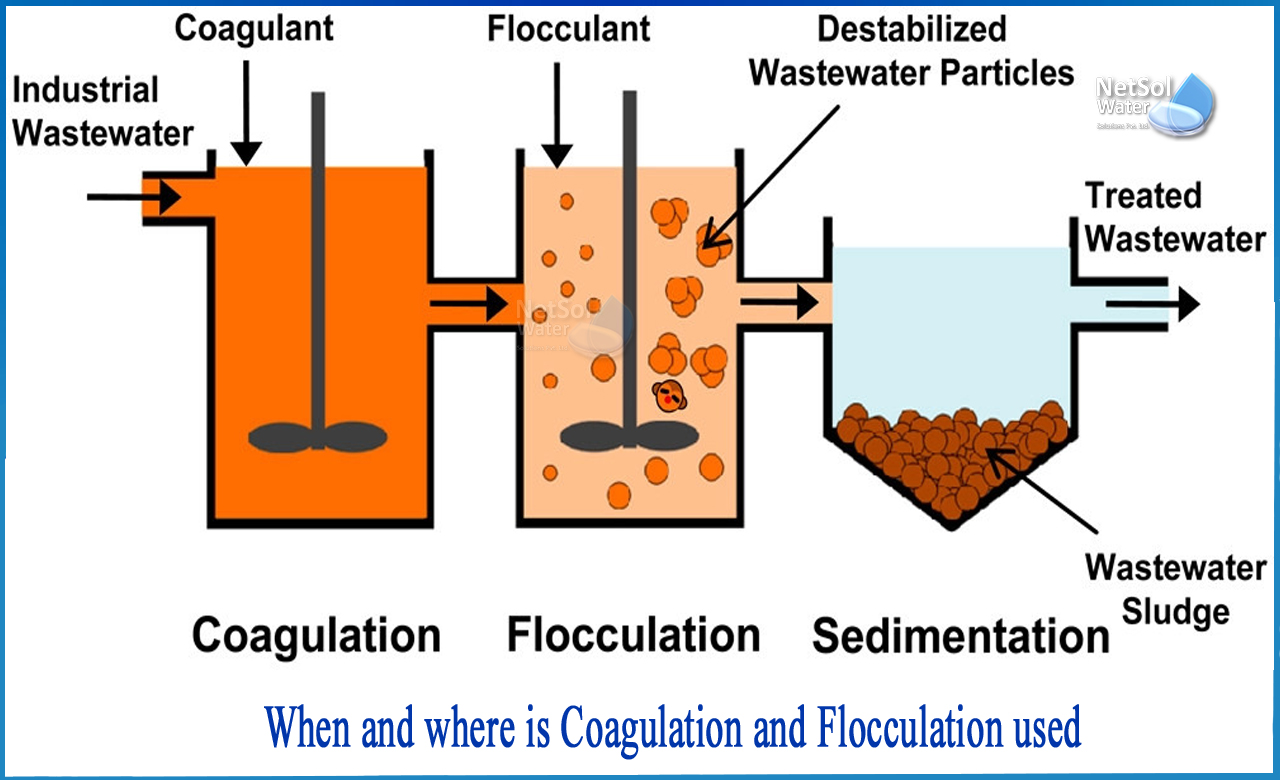Coagulation and Flocculation in Wastewater Treatment
Coagulation and flocculation are two important processes in water and wastewater treatment for separating and removing suspended materials. To minimize turbidity, such techniques improve the purity. These draw suspended materials out of the water that would otherwise take days or even decades to settle out naturally.
If chemicals are available and dosage is adjusted to the water composition, coagulation and flocculation are relatively straightforward and cost-effective. It is frequently incorporated, regardless of the nature of the treated water or the overall treatment scheme used, either as a pre-treatment phase (e.g. before quick sand filtration) or as a post-treatment step (e.g. after sedimentation).
While coagulation is essentially a chemical process, flocculation is mostly a physical process that involves the clumping of particles!
The flocculation process begins with agitation or mixing of the fluid after the coagulation step has completed. Because of which some of the suspended particles begin to cluster together and form larger clumps. The inclusion of flocculants and mixers aids this process.
Mixing the process fluid after the colloidal particles have had their charge neutralized permits more of these particles to come together. The purpose of this procedure is for the clustered particles to reach a state where they can be filtered out of the water as readily as possible.
When and where is coagulation and flocculation used?
These are critical stages in the treatment of both drinking water and wastewater. They provide a reliable approach for lowering water turbidity (the cloudiness or haziness of a fluid that is normally invisible to the human eye), which is a key indicator of water quality. They can reduce SS and organic loads by approximately 90% in wastewater. These are two separate processes that work together to overcome the forces that keep suspended particles stuck in place. While coagulation neutralizes the particles' charges, flocculation allows them to bind together and develop in size, making it easier to extract them from the liquid.
What is the difference between flocculation and coagulation?
The proc?esses of flocculation and coagulation are employed to thicken a fluid. These names are sometimes used interchangeably.
A: Then, what's the distinction between coagulation and flocculation?
Coagulation is a chemical process that thickens fluid, whereas flocculation is a mechanical process.
B:Flocculation or coagulation, which comes first?
Coagulation is usually done first, followed by flocculation.
C:What are the differences between coagulants and flocculants?
Coagulants and flocculants are substances that help particles thicken in water so that they may be filtered out more easily later.
D:What is result of adding coagulants and flocculants at the same time?
When coagulants and flocculants are used together, great dewatering results can be achieved. In terms of both filterability and water content of the sludge cake, the order in which the coagulant and flocculants are dosed is critical for sludge dewatering performance.
Prior to the flocculants, the coagulant should be dosed. With the coagulation flocculation process, more bound water is released into the bulk solution, and the sludge has higher flowability.
What can we do for you?
Netsol Water provides a comprehensive and effective variety of Treatment Plants and solutions that enable wastewater recycling and thereby reduce water consumption. Our holistic treatment approach incorporates a variety of physical, chemical, biological, and membrane processes that act at different levels.
We design, manufacture, supply, erect, and commission Treatment Plants on a turnkey basis for various types and natures of wastewater and effluents that combine advanced physico-chemical treatment processes with a tertiary system for the removal of organic, inorganic, heavy metals, and suspended solids.
For further information or purchase related services, we may be reached via phone at +919650608473 or by email at enquiry@netsolwater.com.



